Perceptions Linked to Views of War
Supporters and opponents of military action in Iraq look at the crisis in very different ways, especially the ongoing efforts of U.N. weapons inspectors.
A majority of Americans (58%) think the weapons inspections process has clearly shown that Iraq will not cooperate and cannot be peacefully disarmed, while roughly a third (34%) think it is too early to tell. As many as 72% of those who favor military action are convinced that Saddam Hussein will not cooperate. But just 28% of war opponents agree, with a majority (60%) saying it is still too early to tell.

By more than two-to-one (61%-27%), the public believes that U.N. weapons inspectors have found proof that Iraq is trying to hide weapons of mass destruction. Three-fourths of supporters of military action (73%) think the inspections have discovered such evidence. Opponents are more divided on this key perception, with 38% believing that the inspectors found proof, and half (50%) saying they did not.
Fewer Link Saddam to 9/11
A solid majority of the public (57%) believes that Saddam Hussein provided assistance to the men who carried out the 9/11 attacks, while 27% do not. But the number who think Saddam was involved in Sept. 11 has declined from 66% last fall. Two-thirds (66%) of those who support the use of force think Saddam was involved in 9/11; only 20% disagree. Opponents of war are more evenly divided on the question — 39% think he was involved, 45% do not.
The public remains divided on the question of what the Iraqi people will do if the U.S. launches military action. A small plurality (44%) believes that most Iraqis will support Hussein, while 39% believe they will turn against him. These perceptions are essentially unchanged from October of last year. But there is a growing sense that a war with Iraq may be completed relatively quickly. In the current poll, about half (49%) say the war will be quick, while 43% expect a long war. Last August, just 38% expected it to be short while 52% anticipated a lengthy conflict.
Bush, Powell Have An Impact

The impact on public opinion of Bush’s State of the Union address, followed by Powell’s address to the U.N. Security Council in early February, is apparent in the new survey. Today, 52% say Bush has clearly explained what’s at stake as to why the U.S. might use military force in Iraq, up from 42% a month ago. Not since just after his speech to the United Nations in mid-September of last year has the President received such high marks for his explanation of the reasons for war.
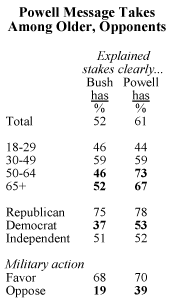
Powell remains the more persuasive administration figure, however. Six-in-ten (61%) say Powell has made the case for the use of force clearly, while just 30% disagree. The gap between Bush and Powell as communicators is particularly large among Americans over age 50 and among those who oppose military action in Iraq. While younger Americans see the president and the secretary of state as equally persuasive, older Americans are much more likely to say that Powell has made the case for war than Bush. And while those in favor of military action find both men to be convincing, war opponents are twice as likely to say Powell makes a clear argument (39%) than Bush (19%).
U.N. Backing Important But Allies’ Support Critical
Americans continue to express the need for securing international backing for military action against Iraq, but they appear to make a distinction between formal authorization for force by the United Nations and support from U.S. allies. The former is seen as desirable, while the latter is viewed as essential.
Most Americans (57%) believe the U.S. should first get a United Nations resolution before any military engagement; 33% say this is not necessary. Aside from a sharp partisan divide on this issue (most Republicans think a U.N. resolution is not necessary, most Democrats and indepe ndents think it is), this view is consistent across most major demographic groups. One exception is that younger Americans, who are slightly more supportive of military action overall, place a higher priority on working through the U.N. than do older Americans.

Yet while desirable, a U.N. resolution is not a necessity in the view of most Americans, if it is blocked by just a few opposing countries on the U.N. Security Council. As long as most of America’s allies back military action, the majority of those who support pursing a resolution from the U.N. are willing to use force even if such a veto occurs. Overall, 30% of Americans feel this way compared with 22% who disagree.
Allied Support: Not There Yet

On the crucial question of allied support, just 37% of Americans think the U.S. currently has enough international support to use military force against Iraq, while 56% think it still must convince more allies to go along. This view is not held solely by war opponents. Even those who favor military action are divided over whether the U.S. still has to do more to bring the allies on board (45% say yes, 49% think there is already enough international support).
Men and women also differ on this issue. Women are much more eager than men to see the U.S. do more to convince its allies that this is the right course of action, and this is true even of women who favor military action.
Who Backs War?
As has been the case over the past six months, men are generally more supportive of military action than are women. Currently, 73% of men favor the use of force in Iraq, compared with 63% of women. But the gender gap is relatively minor when compared to other demographic differences on the issue of war. Just 44% of African-Americans favor military action in Iraq, compared with 67% of Hispanics and 73% of whites. And support for the use of force is lower among college graduates (58%) than among those who did not finish college (71%).

Residents of rural areas express more support for military action in Iraq (78%) than do residents of more heavily populated areas. And white evangelical Protestants make up one of the strongest pro-war constituencies, with 85% favoring military action and just 10% in opposition.
Although majorities in all partisan groups favor taking action in Iraq, there remains a substantial partisan divide. Just a slim majority of Democrats (54%) favor the use of force, but fully 87% of Republicans are on board. Political independents fall in between, but 30% of independents say they oppose military action, much closer to the level of opposition among Democrats (38%) than among Republicans (10%).
Vets More Supportive of Force
Military veterans are somewhat more supportive of taking action in Iraq than those who have not served in the armed forces. Among men who are either currently enlisted, in the reserves, or are veterans, 79% favor using force in Iraq, compared with 70% of men who have no personal military background. This gap is consistent even when the man’s age is taken into account (military service is much more widespread among older generations).
One of the biggest gaps between veterans and non-vets is over the administration’s justifications for war. Fully 68% of male veterans think Bush has clearly explained the stakes in Iraq, compared with just 52% of men with no personal military background. Military men are also more likely to be convinced that inspections will never lead to cooperation from Iraq, and that there is already enough international support for the use of force.
Dissenting Views Draw Interest
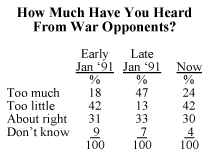
A plurality of respondents (42%) say they have heard too little about the views of Americans who oppose taking military action in Iraq. Three-in-ten think the coverage of antiwar views has been “about right,” and one-quarter (24%) say they have heard too much.
Not surprisingly, a solid majority (63%) of those who oppose military action believe their side has not gotten enough visibility. But even among supporters of the use of force in Iraq, 35% say they would like to hear more from opponents, compared with 30% who say they have heard too much.
Opinion on this question is comparable to early January 1991, just before Congress passed a resolution approving the use of force to evict Iraq from Kuwait. In the 1991 poll, 42% said they had heard too little from opponents of war, 18% had heard too much, and 31% said they had heard about the right amount. In late January, after Congress approved the use of force and the air war had begun, a plurality (47%) said they were hearing too much from the opposition.
Concern Over War’s Impact on U.S. Image
Roughly half of Americans (51%) believe that U.S. military action against Iraq will inflict “a lot” of damage on the U.S. image in the Muslim world, while 42% think it will cause little or no harm. Those results are largely unchanged since October, when 48% felt that war would inflict a lot of damage on the U.S. image in Muslim countries.
There is less concern over possible damage to the U.S. image in Western Europe. Most Americans (54%) believe a war with Iraq would cause little or no harm to the U.S. image there. Still, as many as four-in-ten think war would cause a great deal of damage to the U.S. image in Europe.
Opponents of military action in Iraq overwhelmingly see major harm being done to the U.S. image among both Muslim nations (74%) and in Western Europe (73%) if the United States goes to war. Supporters of the use of force are far less concerned, particularly about possible damage to the U.S. image in Western Europe. Four-in-ten war supporters (42%) think the U.S. image among Muslim nations will be seriously damaged, but just 26% say that about the U.S. image in Western Europe.
Strains in the Alliance
There is general agreement that the growing tensions between the United States and some of its European allies have already taken a toll on trans-Atlantic relations. Fully 66% of Americans say the United States and Western Europe are moving apart, compared with 24% who think the relationship is as close as it has been.

In spite of the recent strains, the American public by two-to-one (62%-29%) favors maintaining close ties with Western Europe rather than taking a more independent approach to security and diplomatic affairs. This stands in sharp contrast to the broad desire of Europeans to take a more independent approach from the U.S., reflected in a five-nation Pew survey conducted in April 2002. At that time, majorities in three of four Western European nations surveyed (France, Italy and Germany) supported a more independent approach, while British respondents were evenly split (see “Americans and Europeans Differ Widely on Foreign Policy Issues,” April 17, 2002).
In the U.S., college graduates are much more supportive of maintaining close ties with Western Europe compared with those with no more than a high school education (77% vs. 55%). And seven-in-ten of those who either oppose military action against Iraq (73%), or condition their support on allied backing (70%), favor keeping close ties with Western Europe; barely half of those who support unilateral military action agree (51%).
Assessing Reasons for Allied Objections
When Americans are asked to cite reasons why some allied nations oppose military action against Iraq, a 45% plurality expresses the view that these countries do not want to pay the costs and risk the casualties involved in war. Just a third take a less skeptical view, saying that these countries simply favor other ways of dealing with Saddam Hussein.
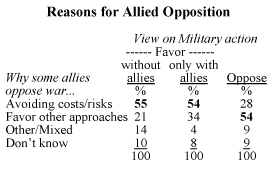
Significantly, those who condition their support for war on allied backing — as well as those who would back unilateral military action — see nations who oppose war as motivated by reluctance to incur costs and casualties. More than half (54%) of those whose support of war is contingent on allied backing believe nations that oppose military are motivated by those factors; 34% think they favor alternative ways of dealing with Saddam Hussein.
People who take a less qualified view of military action are more polarized in their assessments of why some allies are opposed to military action in Iraq. By more than two-to-one (55%-21%), those who are willing go to war even without allied backing say nations that oppose the war do not want to incur costs and casualties. By roughly a similar margin (54%-28%), those who oppose military action say these allies simply favor alternative ways of dealing with Iraq.
Most Favor Major Effort to Help Postwar Iraq
As the perception increases that war is likely, attention is increasingly turning to what a postwar Iraq would be like and what the U.S. role would be. A strong majority of 63% favors a major U.S. effort to rebuild Iraq and establish a stable government after the war; 30% oppose this course of action. Support is no different from when this question was first asked in October last year.
Support for rebuilding Iraq is stronger among proponents of military action. Among those who support the use of force, 68% favor a postwar reconstruction effort, with 27% opposed. Among opponents of going to war, just half say they would favor such an effort; 42% would oppose it.
War Concerns Rise

Public fears about how a war with Iraq might unfold have grown somewhat since late October. Two-thirds (66%) now worry a great deal that Iraq might use chemical or biological weapons against U.S. troops, up from 59% in October. Similarly, more now worry a great deal that war might spur additional acts of terrorism within the U.S.: 57% now, 51% in October. And worries that a war might result in many Iraqi civilian casualties also rose by seven percentage points, from 40% to 47% today.
A majority of the public still worries a great deal about the prospect of high U.S. casualties (55%). It currently stands at about the same level as seen in January 1991, after the air war began but before the allied invasion with ground troops. Other concerns — that war may trigger a broader Mideast conflict or that it will take a long time to rebuild Iraq afterward — have remained stable over the past four months.
Code Orange Boosts Terrorism Anxiety
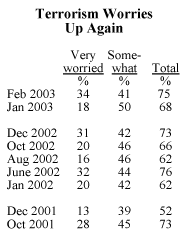
Public anxiety about another terrorist attack in the U.S. rose significantly this month following the widely publicized move by the Department of Homeland Security to raise the nation’s alert status to Code Orange. Fully one-third (34%) say they are now “very worried” that there will soon be another attack, and 41% are somewhat worried.
Moreover, half the public is fearful that they or their families may become victims of terrorism (22% very concerned/29% somewhat concerned). That is the highest level of personal worry about terrorism since the fall of 2001, shortly after the 9/11 attacks.
About one quarter of the public (23%) say they have personally taken steps to prepare their home for the possibility of a terrorist attack by storing supplies or creating a protected area where their family can take shelter. Overall, the number of people who report taking such steps is unchanged since November 2001, but 8% of the public — representing about nine million households — report having made preparations in the past week, since the Code Orange alert. People living in the largest cities along the East Coast are more than twice as likely as those living elsewhere to say they have taken steps in the past week to prepare for an attack (16% versus 7%).
Homeland Defense or Overseas Action
When asked to choose how best to deal with the threat of terrorism, a plurality of Americans (46%) prefer building defenses at home, rather than taking military action to destroy terrorist networks overseas (39%), with 8% insisting that both should be done. But this margin is smaller than in late August, when homeland defense was preferred by a margin of 51% to 30%. A preference for military action rose among Republicans and Democrats alike, among both men and women, and was up sharply among evangelical Protestants.
Iraq Debate Tops News Index
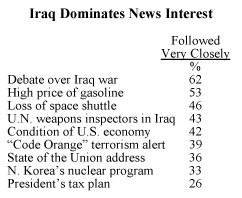
Possible war with Iraq continues to top the public’s news interest. Six-in-ten Americans (62%) say they are following the debate over military action in Iraq very closely, and another quarter are following fairly closely. Attention is up from a month ago, when 55% said they were following the debate very closely. This month’s level of interest is comparable to the period just prior to the start of the Persian Gulf War in January 1991 (59%).
Moreover, a growing number of Americans are following reports about the weapons inspection process in Iraq. Fully 43% are following news about the work of U.N. weapons inspectors very closely, up from 34% a month ago.
As in the past, rising gasoline prices are attracting considerable public interest. Roughly half of Americans (53%) are following news about fuel prices very closely. Reports about the condition of the U.S. economy garnered very close attention from 42% of the public, with a third of Americans following this story fairly closely. This figure has remained steady for the past few months.
Nearly half the nation (46%) followed news about the loss of the space shuttle Columbia very closely, with another 36% following this story fairly closely. While interest in this story was high, it is significantly less than public attention in the 1986 explosion of the space shuttle Challenger (80%), which has ranked among the top stories in Pew Research Center’s News Interest Index for the past two decades.
The recent Code Orange alert about the increased risk of a terrorist attack was followed very closely by four-in-ten Americans (39%). This is comparable to the level of interest in September 2002, the last time the index was raised to this level. Attention to this story has been particularly high in the East and South.
Slightly more than a third (36%) said they followed the president’s State of the Union address very closely. This is higher than in the first President Bush’s State of the Union in 1992 and President Clinton’s address in 1994 (26%). Interest in George W. Bush’s tax cut and economic stimulus plan is about the same as last month, with 26% following it very closely.
In contrast to the widespread interest in possible war with Iraq, only a third of the public was paying close attention to North Korea’s nuclear weapons program. Interest levels have remained stable in the last month.




